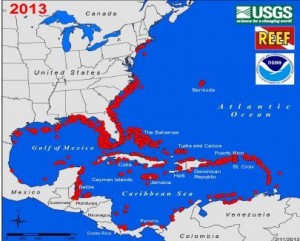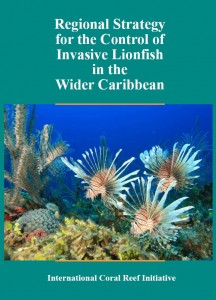 The Regional Lionfish Committee, also known as Ad Hoc Committee for the Caribbean Regional Response to Lionfish Invasion, was established in November 2010 by the International Coral Reef Initiative1 (ICRI) in response to the growing threat caused by the invasion of the lionfish (Pterois volitans and P. miles) in the Wider Caribbean. The Regional Lionfish Committee (RLC) is the result of the combined efforts of United Nations Environmental Program – Caribbean Environment Program (UNEPCEP) and its Regional Activity Center for the Protocol on Specially Protected Areas and Wildlife of the Cartagena Convention (SPAW-RAC), and partners including the government of Mexico and its Commission on Protected Areas (CONANP), the government of the United States and its National Oceanic and Atmospheric Administration (NOAA), Reef Check Dominican Republic, Centre for Agricultural Bioscience International (CABI), Reef Environmental Education Foundation (REEF), and representative Caribbean experts to address the lionfish issue in the Caribbean. In response to its mandate, the RLC coordinated the development of a regional Strategy that is intended to help guide action by stakeholders concerned with, and impacted by, the lionfish invasion.
The Regional Lionfish Committee, also known as Ad Hoc Committee for the Caribbean Regional Response to Lionfish Invasion, was established in November 2010 by the International Coral Reef Initiative1 (ICRI) in response to the growing threat caused by the invasion of the lionfish (Pterois volitans and P. miles) in the Wider Caribbean. The Regional Lionfish Committee (RLC) is the result of the combined efforts of United Nations Environmental Program – Caribbean Environment Program (UNEPCEP) and its Regional Activity Center for the Protocol on Specially Protected Areas and Wildlife of the Cartagena Convention (SPAW-RAC), and partners including the government of Mexico and its Commission on Protected Areas (CONANP), the government of the United States and its National Oceanic and Atmospheric Administration (NOAA), Reef Check Dominican Republic, Centre for Agricultural Bioscience International (CABI), Reef Environmental Education Foundation (REEF), and representative Caribbean experts to address the lionfish issue in the Caribbean. In response to its mandate, the RLC coordinated the development of a regional Strategy that is intended to help guide action by stakeholders concerned with, and impacted by, the lionfish invasion.
The draft Strategy was developed by members of the RLC and key lionfish experts who met in Puerto Rico on 3–6 September 2012 to initiate Strategy development. Following reviews, the draft was presented at the Fifteenth Intergovernmental Meeting of the Parties to the Cartagena Convention on 2012. Likewise, during the Insular Caribbean Aquatic Invasive Species Risk Assessment Tool: Regional Training Course, held in April 2013 in Jamaica, the Strategy was presented at the session on exchange of experiences in managing the Lionfish Invasion in the Insular Caribbean.
Read Full Document Here: ICRI_lionfish_Strategy_En (PDF)
